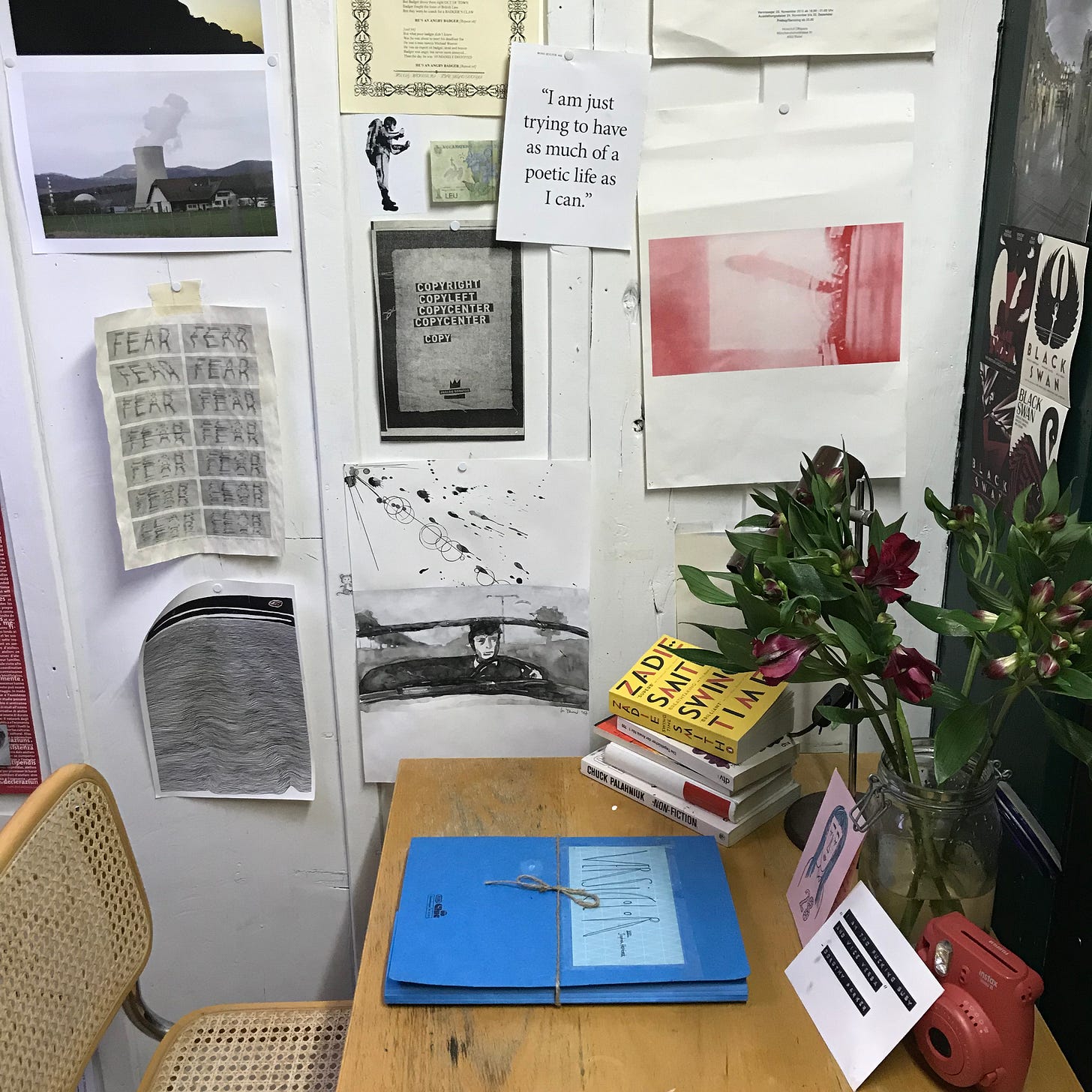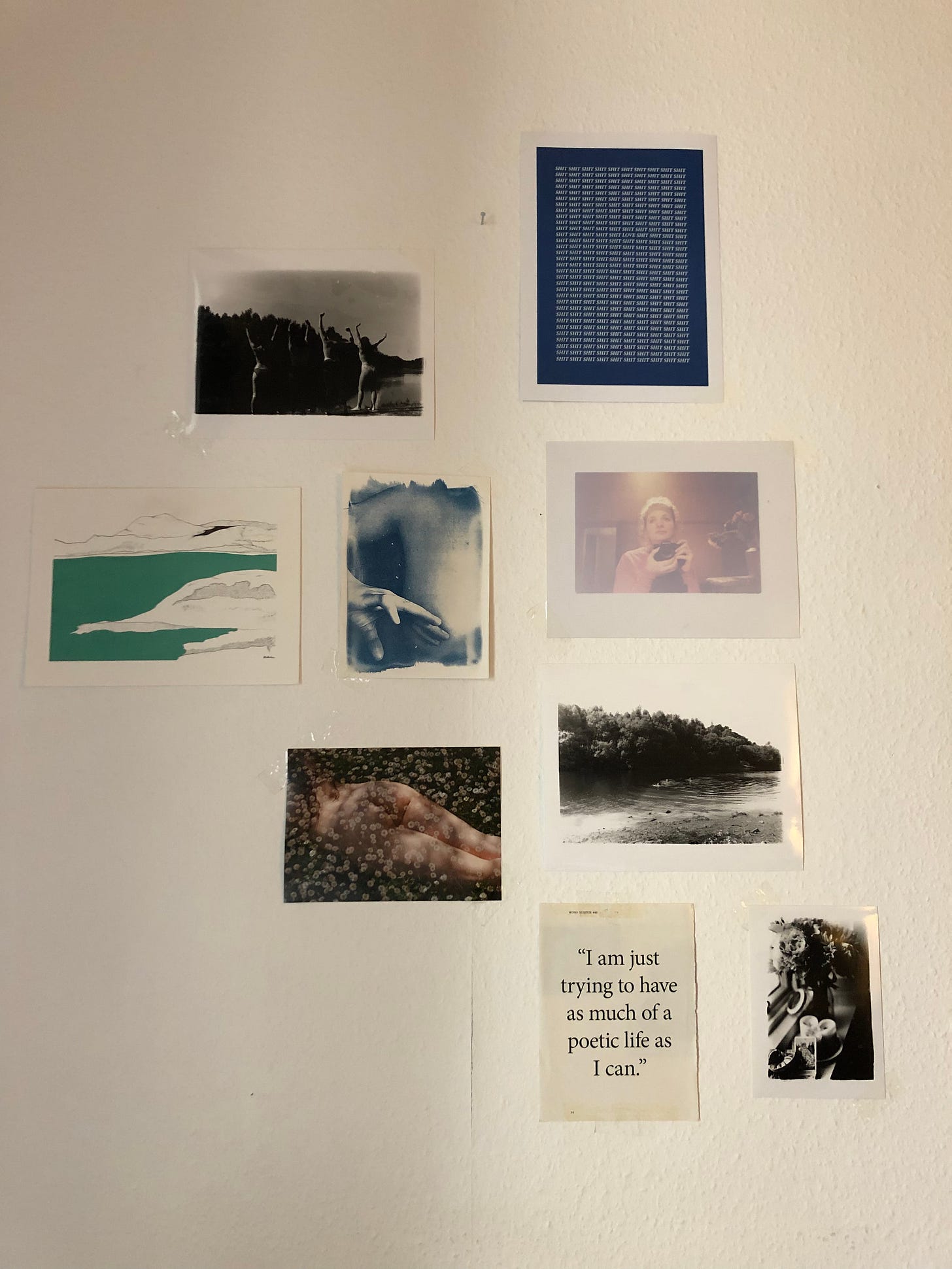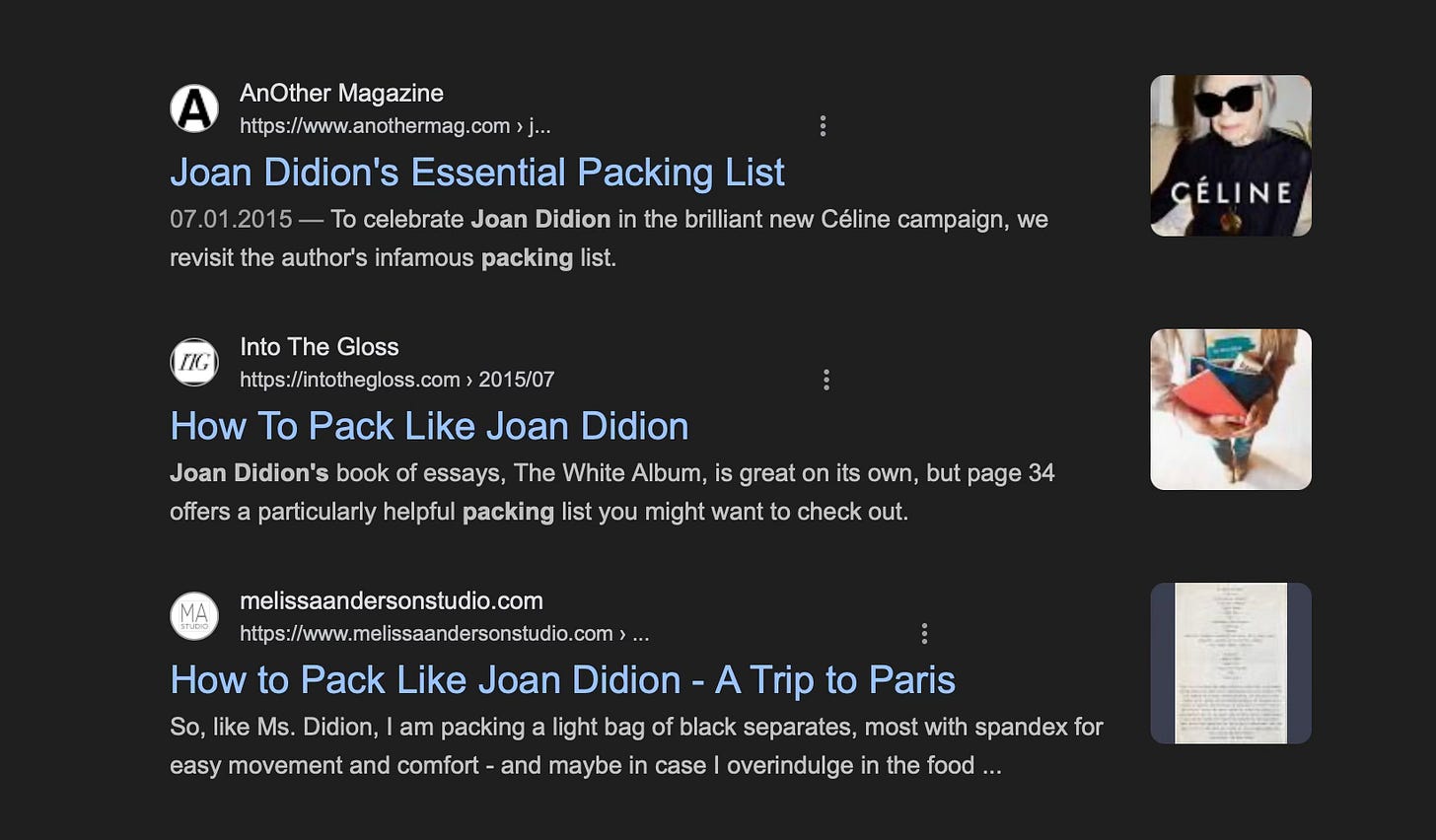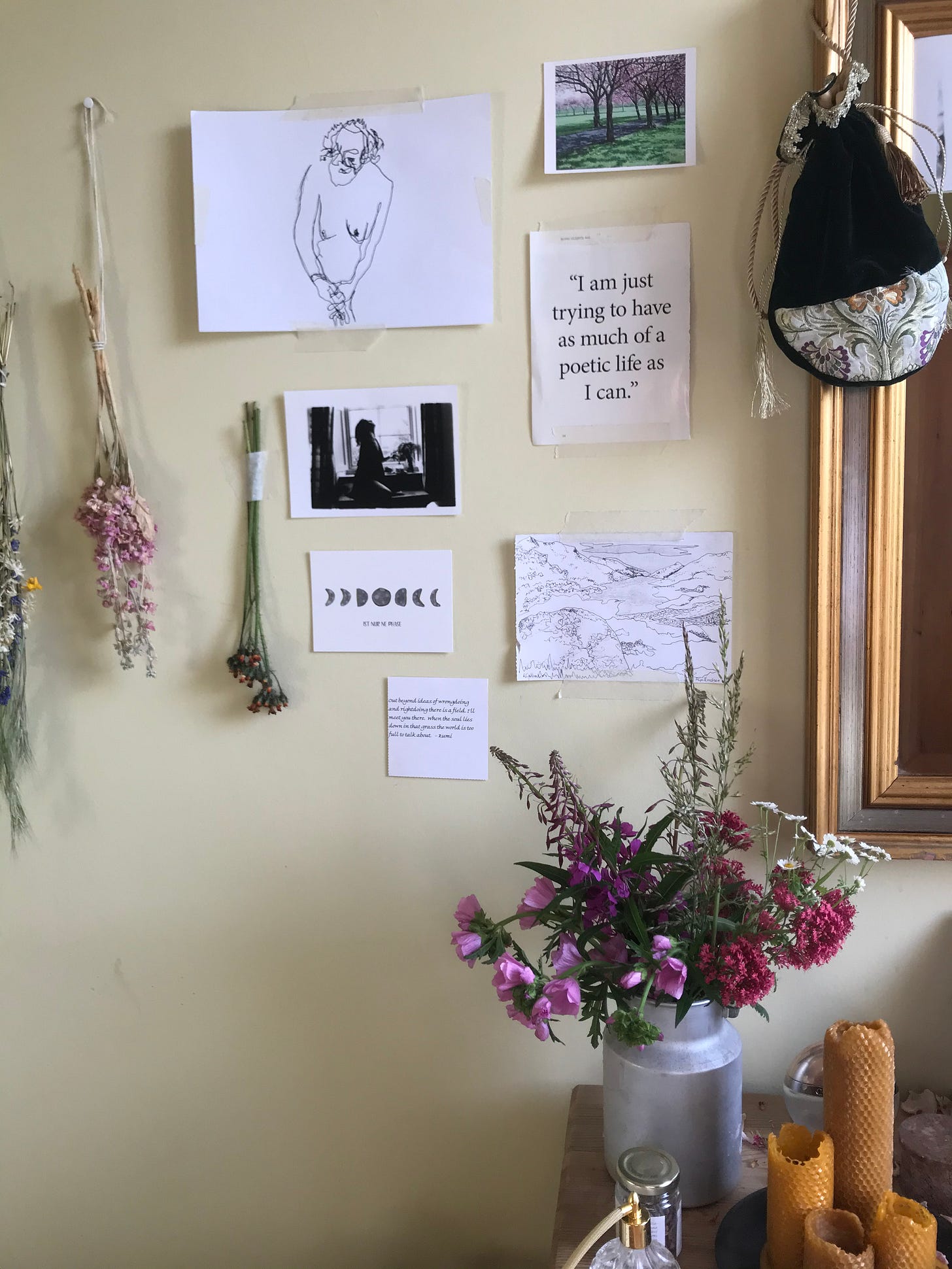"I am just trying to have as much of a poetic life as I can."
“to live” and not “to lifestyle” | The Muse Letter No. 175
I used to have this quote on my wall that moved with me from home to home like a talisman. I’d torn it from the pages of a magazine years ago, when I was still living in Berlin and life was very hard and I was falling through trap doors left and right.
I brought it with me to my first writers’ residency in Switzerland in 2018. Pinning it onto the wall that was already covered in a rich tapestry of former residents’ art traces, it was supposed to remind me of why I was here specifically but also in general: what I was doing in life.
That I had made a promise to myself long ago. Long before I stumbled upon that quote. That finding it was just a reminder. A manifestation in words.

"I am just trying to have as much of a poetic life as I can.”, written in bold letters on an A5 paper. Just as bold as the woman who spoke them, the French multi-disciplinary artist Sophie Calle. I had always admired her way of following her whims, which had led her to literally follow an acquaintance all the way to Venice or asking 107 women to analyse a breakup e-mail she once received from an ex, culminating in the artist book Take Care Of Yourself. I admired her but more importantly, I understood why. It is, after all, how I live my life most of the time. Following threads that are meaningful to me, weaving a narrative out of feelings, symbols and dreams. Co-creating with life. Using my own biography for art.
The residency consisted of a tiny room in an attic with a huge rooftop terrace overlooking Zurich, which in January was kind of useless. „Very romantic.“ We repeated in different variations as they were showing me around, trying to find new angles to look at the 8 square meters in front of us. A mattress on the floor tucked into the sloping roof, a tiny desk, a cupboard with some kitchen utensils, and, on top of it, a hot plate. For running water I had to go to the bathroom across the attic, which I was sharing with another artist who had a studio there. I never met him during my time but heard him singing in the shower once.
I remember sitting down at that desk and working on a novel draft. I remember cooking meatballs in tomato sauce and buying flowers and lighting slim candles that I found, sticking them on a plate like a birthday cake. I remember visiting exhibitions and standing in front of a triptych by the painter Francis Bacon. He would always find me when I needed it.
“I like to imagine exhibitions is where we all go to change.”, Gabrielle de la Puente & Zarina Muhammad write in their debut genre-bending novel Poor Artists, a sentiment that I share. When I’m lonely or heartbroken, bored or desperate, stuck and fed up and angry at the world, I like to find myself wandering around strangers, placing my attention to something outside of myself.
Years later I would write in an early draft of Things I Have Changed: Somewhere in an attic, a dusty chaise lounge, piles of books, the starving artist sits. A beautiful woven throw around their shoulders, hunched over their work, as snow is falling slowly outside their round window, perhaps distant church bells in the background, a dainty flower in a make-shift vase; an old perfume bottle that is now used as a candle holder. Recreating the attic I stayed in for two months whilst also later on criticising the romanticism of an artist’s life and examining its impact on work culture and expectations of what an artist is and how they have to present.
What does it mean to live a poetic life?
Black turtlenecks, coffee and walls of books while huffing a rolli?
Or is it much more like de la Puente & Muhammad describe in a chapter called phrogging1 where artists illegally live in their studios, weeing in “a bucket after dark so security don’t catch on, (…)”, risking being sued and other punishments to live their life as artists who cannot technically afford to work as such.
“the desire to editorialize our own experiences (to romanticize the unseen, to live for our biographies) has become an autonomic facet of womanhood as unavoidable as breathing”, writes Rayne Fisher-Quann in her 2022 viral essay standing on the shoulders of complex female characters and I think I would extend this to the artist persona in equal measure.
Every writer who ever published a book knows that a book needs more than good writing, it needs story, it needs exposure, it needs that je ne sais quoi that makes people obsess over your packing list. Oh to be a literary It girl.
And most of all it needs the illusion of easefulness, that everything fits into the grand story arc, perpetuated now by TikTok trends, memes and an algorithm that feeds on itself, every note a copy of a copy of a copy of a different way of saying the same thing again but in other words as is grossly apparent on the Notes feature of Substack at the moment … everyone seeing everything all at once, all the time: it homogenises what a poetic life looks and sounds like and thus creates a blueprint to perform and if done well, succeed. Which of course to a huge degree relies on high social and financial privilege in the first place.
"I am just trying to have as much of a poetic life as I can.” I don’t think Calle meant to cut your hair in a long bob, wear dark shades and have a cold can of Coke for breakfast in the morning. Or to clasp teacups, write on a typewriter at 5 AM and frolic mindfully over fields of flowers.
Calle meant “to live” and not “to lifestyle”.
There’s a German word I don’t hear thrown around a lot anymore, partly because I live in Scotland and partly because it’s kind of old-timey: the Tausendsassa. If you google its translation into English it will give you the Jack of all trades but I’m afraid that is incorrect. A Jack of all trades is someone who is good at a lot of things which shares the sentiment of the Tausendsassa but a Jack of all trades is also a master of none, there’s a hint of peasantry, it’s Jack after all, a guy who dies because there’s “not enough space” on a door.
A Tausendsassa on the contrary is someone who lives life at large, who takes every opportunity, an over-achiever, a polyglot, who asks “How much for the world?”. Someone who will ring the bell at the tavern and throw another round. As I said it’s an old German word, hence the tavern metaphor which is perhaps why I love it even more.
This is what I think of, when I imagine to live a poetic life.
A few weeks ago, I attended a networking event where I met a guy I had only known online. When we finally spoke face-to-face for the first time, he said, “It’s like you are completely yourself on Instagram.”, to which I clumsily replied: “Well, who else would I be?”.
He elaborated and explained that while I do post about my professional life as a writer & artist which seemed to follow an aesthetic, I also sometimes posted these “kind of weird things” that he found would not necessarily belong to the polished image that others would want to portray. Which reminded me of a thing that people often say, when they enter my living room, that "it looks like you in here.” And sometimes I do wonder if it is really intended as a compliment but I take it either way.
I used to create these collages on my wall— now shrines of former selves, to remind me of who I was and wanted to be. I guess, I don’t need them anymore.
I am, I am, I am.2
As always, if you’d got something out of this and would like to help make my writing possible, consider upgrading to a paid subscription. It really makes a huge difference x
NEWS! NEWS! NEWS!
ONLY A FEW SPOTS LEFT!
I am opening up my next essay writing classes in English and German in February. You’ll not only discuss your work in a supportive group of aspiring writers for six months but you’ll also get the chance to work on your writing in 1:1 mentoring sessions with me.
If you finally want to take your writing to the next level and finish that book: sign up now and secure your spot.
Each class is intentionally small, so that we can focus and discuss each writer’s project in depth. The last seven classes sold out pretty quickly, so if you know this is for you, do not wait.
Write your Essay Collection in 6 Months!
“Sophia's class is a breath of fresh air. The sessions are inspiring, nurturing and informative, and her advice is broad (and highly knowledgable) yet tailored to the individual and their specific writing goals. Her enthusiasm for her craft is infectious, and she genuinely wants to see us succeed with our writing. I highly recommend it!“
Lucy Siddall (currently enrolled in the autumn/winter essay writing class)
Write your Essay Collection in 6 Months!
In this creative writing workshop I will teach how to create beautiful, intricate essays with the aim to produce a collection at the end to submit to publishers.
Schreib deinen Essayband in 6 Monaten!
In diesem kreativen Schreibworkshop bringe ich dir bei wie man literarische Essays schreibt, die berühren mit dem Ziel am Ende eine Sammlung in der Hand zu haben, die man an einen Verlag schicken kann.
About your instructor:
Sophia Hembeck is a writer and visual artist based in Edinburgh. She has published two books of essays called: Things I Have Noticed, 2020 & Things I Have Loved, 2023 and currently working on her 3rd to conclude the Things-Trilogy. Her bestselling substack 'The Muse Letter' is published every month, where she wonders about the meanderings of life. She holds a M.A. in Playwriting (Szenisches Schreiben, UdK Berlin) and teaches creative writing classes since 2020. She is represented by Zoe Martin from JE Literary Agency in Berlin.
Honestly please read Poor Artists, it’s sooo good x
Of course she is quoting the O.G. lit girl: “I took a deep breath and listened to the old brag of my heart. I am, I am, I am.”―Sylvia Plath, The Bell Jar







